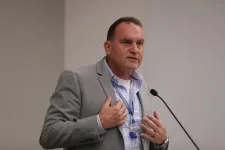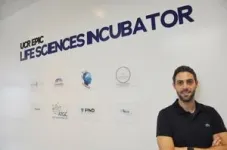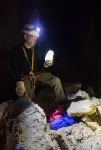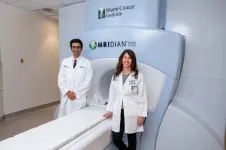(Press-News.org) Soon after he joined UC Riverside in 2015, Maurizio Pellecchia, a professor of biomedical sciences in the UCR School of Medicine, began working with the UCR Research and Economic Development office to create on campus an incubator space. He envisioned that space as a home for UCR scientists to create startup companies to prove the commercial potential of their technologies. That multi-year effort helped create in the Multidisciplinary Research Building the EPIC Life Sciences Incubator that currently houses young companies in agricultural technology, biomedical technologies, bioengineering, and medicinal chemistry.
One of the tenant companies in the incubator space is Armida Labs, Inc, a pharmaceutical company founded two years ago by Pellecchia with Carlo Baggio, formerly a senior scientist in Pellecchia’s research group, as its chief technology officer and director of chemical biology. Armida Labs, which is developing a breakthrough pancreatic cancer therapy called Targefrin™, has now been awarded a highly competitive $400,000 Phase I Small Business Innovation Research, or SBIR, grant from the National Cancer Institute of the National Institutes of Health. The grant, of which Baggio is principal investigator, will allow the company to complete important next steps toward the preparation of human clinical trials.
“Our goal is to develop the drug Targefrin, which UCR has patented,” said Pellecchia, who holds the Daniel Hays Chair in Cancer Research at UCR. “We want to translate Targefrin from a laboratory discovery to a product that can fight pancreatic cancer, and potentially other cancers, and improve public health.”
Pellecchia, who is the main inventor of Targefrin, explained that the SBIR grant makes it possible for Armida Labs to gather industry-standard pharmacokinetics and efficacy data, which are expensive to obtain.
“Without the grant, our studies would remain at the pre-clinical level,” said Pellecchia, who directs the School of Medicine’s Center for Molecular and Translational Medicine. “The Phase I SBIR grant will allow us to scale up the manufacture of Targefrin and to test this drug in more sophisticated pharmacology studies in models of metastatic pancreatic cancer. These data will help us craft the necessary follow-up studies that will enable filing an investigational new drug application with the Food and Drug Administration, and if successful, begin human clinical studies.”
The SBIR grant Armida Labs received is a Phase I grant, which means it is a pilot phase grant. Only recipients of a Phase I grant can apply to the NIH for a Phase II grant.
“Phase II grants, which can be up to around $2 million, can allow us to apply for an IND,” Pellecchia said. “We expect our pilot studies will take about six months to one year to do. If these studies are successful, we will submit a Phase II application, which will allow us to complete toxicity studies in two animal models.”
An investigational new drug, or IND, is a drug that the Food and Drug Administration has not yet approved for general use. Researchers use INDs in clinical trials to investigate their safety and efficacy. Before testing in human subjects, however, researchers need to apply for an IND with the Food and Drug Administration.
According to Pellecchia, the EPIC Life Sciences Incubator greatly simplified the launch of Armida Labs, the first UCR faculty biopharmaceutical company in the City of Riverside. He said it is a lot easier to start a company in an incubator space than to have to rent an empty lab space somewhere to start doing research.
“Developing and growing a biotech company requires huge amounts of capital,” he said. “In contrast, a minimal amount of capital is needed to launch a startup in an incubator space. As a result, we were able to get Armida Labs off the ground and thus apply to the National Cancer Institute for seed funding. To go from a pre-clinical laboratory discovery all the way to drug development in patients, similar projects to Targefrin often require as much as $2-5 million. With our new award, we aim to complete valuable steps to attract further investment.”
The EPIC Life Sciences Incubator, which is managed by Maricela Argueta and directed by David Pearson, aims to be a home for startups like Armida Labs by providing vital technology and equipment, as well as access to UCR’s core technical facilities, faculty, and entrepreneurial development services from the Office of Technology Partnerships led by Associate Vice Chancellor Rosibel Ochoa. It offers advice, makes connections with venture capital firms, administers the incubator space, and provides personnel for coordinating the use of shared equipment.
Pellecchia is excited to have launched Armida Labs and acquired the SBIR grant. As the company grows, it will hire more personnel.
“Nothing would make me happier than to see our UCR research translated into experimental therapeutics. I am also thrilled to create new biotech jobs in Riverside, a region lacking incubator spaces where biotech companies can start and grow,” Pellecchia said. “At UCR, we graduate thousands of students and train many postdocs. But we are really educating and training them only to see them go elsewhere. We want them to stay and thrive in Riverside.”
END
UC Riverside startup company wins prestigious NIH grant
Small Business Innovation Research grant from National Cancer Institute will accelerate development of pancreatic cancer-fighting drug
2023-10-02
ELSE PRESS RELEASES FROM THIS DATE:
DNA from discarded whale bones suggests loss of genetic diversity due to commercial whaling
2023-10-02
Commercial whaling in the 20th century decimated populations of large whales but also appears to have had a lasting impact on the genetic diversity of today’s surviving whales, new research from Oregon State University shows.
Researchers compared DNA from a collection of whale bones found on beaches near abandoned whaling stations on South Georgia Island in the south Atlantic Ocean to DNA from whales in the present-day population and found strong evidence of loss of maternal DNA lineages among blue and humpback whales.
“A maternal lineage is often associated with an animal’s cultural memories such as feeding and breeding locations that are passed from one generation ...
Viruses dynamic and changing after dry soils are watered
2023-10-02
Viruses in soil may not be as destructive to bacteria as once thought and could instead act like lawnmowers, culling older cells and giving space for new growth, according to research out of the University of California, Davis, published Sept. 28 in the journal Nature Ecology and Evolution.
How viruses affect ecosystems, including bacteria, is challenging to untangle because they are complex and change over time and space. But the first annual rain on Mediterranean ecosystems, such as those in California, offers a kind of reset, triggering activity that can be observed.
Scientists ...
ACC Quality Summit explores practical strategies to reboot and rebrand health care quality
2023-10-02
The 2023 American College of Cardiology (ACC) Quality Summit kicks off on October 11-13 in Orlando, Florida, putting the spotlight on the value of ACC Accreditation and NCDR services to enhance health care quality. Cardiovascular clinicians and stakeholders across the U.S. will converge at this year’s Summit to discuss the role of accreditation and registries in health equity initiatives, best practices for rebooting and rebranding health care quality, and strategies to engage the CV team in the quality process.
“ACC’s ...
One in 3 adults with new-onset AFib occurring during hospitalization will have recurrent episode within a year
2023-10-02
Embargoed for release until 5:00 p.m. ET on Monday 2 October 2023
Annals of Internal Medicine Tip Sheet
@Annalsofim
Below please find summaries of new articles that will be published in the next issue of Annals of Internal Medicine. The summaries are not intended to substitute for the full articles as a source of information. This information is under strict embargo and by taking it into possession, media representatives are committing to the terms of the embargo not only on their own behalf, but also on behalf of the organization they represent.
----------------------------
1. ...
Gene expression signatures of human senescent corneal and conjunctival epithelial cells
2023-10-02
“[...] our results from the RNA-Seq experiments show that senescent ocular surface cells, particularly SCj, have abnormal keratin expression patterns [...]”
A new priority research paper was published on the cover of Aging (listed by MEDLINE/PubMed as "Aging (Albany NY)" and "Aging-US" by Web of Science) Volume 15, Issue 18, entitled, “Gene expression signatures of human senescent corneal and conjunctival epithelial cells.”
In this new study, researchers Koji Kitazawa, Akifumi Matsumoto, Kohsaku Numa, Yasufumi Tomioka, Zhixin A. Zhang, Yohei Yamashita, Chie Sotozono, Pierre-Yves Desprez, and ...
Study: Scientists investigate grand canyon's ancient past to predict future climate impacts
2023-10-02
The Grand Canyon’s valleys and millions of years of rock layers spanning Earth’s history have earned it a designation as one of the Seven Natural Wonders of the World. But, according to a new UNLV study, its marvels extend to vast cave systems that lie beneath the surface, which just might hold clues to better understand the future of climate change — by studying nature’s past.
A research team — led by UNLV paleoclimatologist and professor Matthew Lachniet — pulled an ancient stalagmite from the floor of an undisturbed Grand Canyon cave. By studying the mineral deposits’ geochemistry, they were able to analyze precipitation patterns during the rapidly ...
Study reveals high accuracy of MR-guided radiotherapy for intracranial itereotactic radiosurgery
2023-10-02
A new study, led by radiation oncology physicists at Miami Cancer Institute, part of Baptist Health South Florida, displayed positive results using intracranial stereotactic radiosurgery, also known as SRS, for an MR-guided radiotherapy system. The study, ‘Commissioning Intracranial Stereotactic Radiosurgery (SRS) for an MR-guided Radiotherapy (MRgRT) system: MR-RT Localization and Dosimetric End-to-End Validation’ published in the International Journal of Radiation Oncology - Biology - Physics (IJROBP), highlights positive accuracy through an end-to-end hidden target test to quantify the imaging, planning, and delivery coincidence ...
Trivalent vaccine candidate fights measles, mumps, SARS-CoV-2
2023-10-02
COLUMBUS, Ohio – Altered measles and mumps viruses could be used as a platform to create a trivalent COVID-19 vaccine that triggers immunity to multiple variant strains of the SARS-CoV-2 virus, new research in animals suggests.
The study builds upon previous studies that involved inserting a highly stable segment of the coronavirus spike protein into the measles vaccine or mumps vaccine.
In a paper publishing this week in Proceedings of the National Academy of Sciences, scientists at The Ohio State University report on a new MMS vaccine candidate – for Measles, ...
Simulations reveal the atomic-scale story of qubits
2023-10-02
Researchers led by Giulia Galli at University of Chicago’s Pritzker School of Molecular Engineering report a computational study that predicts the conditions to create specific spin defects in silicon carbide. Their findings, published online in Nature Communications, represent an important step towards identifying fabrication parameters for spin defects useful for quantum technologies.
Electronic spin defects in semiconductors and insulators are rich platforms for quantum information, sensing, and communication applications. Defects are impurities and/or misplaced atoms in a solid and the electrons associated with these atomic defects carry ...
Fair and sustainable futures beyond mining
2023-10-02
Mining brings huge social and environmental change to communities: landscapes, livelihoods and the social fabric evolve alongside the industry. But what happens when the mines close? What problems face communities that lose their main employer and the very core of their identity and social networks? A research fellow at the University of Göttingen provides recommendations for governments to successfully navigate mining communities through their transition toward non-mining economies. Based on past experiences with industrial transitions, she suggests that a three-step approach centred around stakeholder ...
LAST 30 PRESS RELEASES:
When safety starts with a text message
CSIC develops an antibody that protects immune system cells in vitro from a dangerous hospital-acquired bacterium
New study challenges assumptions behind Africa’s Green Revolution efforts and calls for farmer-centered development models
Immune cells link lactation to long-lasting health
Evolution: Ancient mosquitoes developed a taste for early hominins
Pickleball players’ reported use of protective eyewear
Changes in organ donation after circulatory death in the US
Fertility preservation in people with cancer
A universal 'instruction manual' helps immune cells protect our organs
Fifteen-year results from SWOG S0016 trial suggest follicular lymphoma is curable
The breasts of a breastfeeding mother may protect a newborn from the cold – researchers offer a new perspective on breast evolution
More organ donations now come from people who die after their heart stops beating
How stepping into nature affects the brain
Study: Cancer’s clues in the bloodstream reveal the role androgen receptor alterations play in metastatic prostate cancer
FAU Harbor Branch awarded $900,000 for Gulf of America sea-level research
Terminal ileum intubation and biopsy in routine colonoscopy practice
Researchers find important clue to healthy heartbeats
Characteristic genomic and clinicopathologic landscape of DNA polymerase epsilon mutant colorectal adenocarcinomas
Start school later, sleep longer, learn better
Many nations underestimate greenhouse emissions from wastewater systems, but the lapse is fixable
The Lancet: New weight loss pill leads to greater blood sugar control and weight loss for people with diabetes than current oral GLP-1, phase 3 trial finds
Pediatric investigation study highlights two-way association between teen fitness and confidence
Researchers develop cognitive tool kit enabling early Alzheimer's detection in Mandarin Chinese
New book captures hidden toll of immigration enforcement on families
New record: Laser cuts bone deeper than before
Heart attack deaths rose between 2011 and 2022 among adults younger than age 55
Will melting glaciers slow climate change? A prevailing theory is on shaky ground
New treatment may dramatically improve survival for those with deadly brain cancer
Here we grow: chondrocytes’ behavior reveals novel targets for bone growth disorders
Leaping puddles create new rules for water physics
[Press-News.org] UC Riverside startup company wins prestigious NIH grantSmall Business Innovation Research grant from National Cancer Institute will accelerate development of pancreatic cancer-fighting drug









